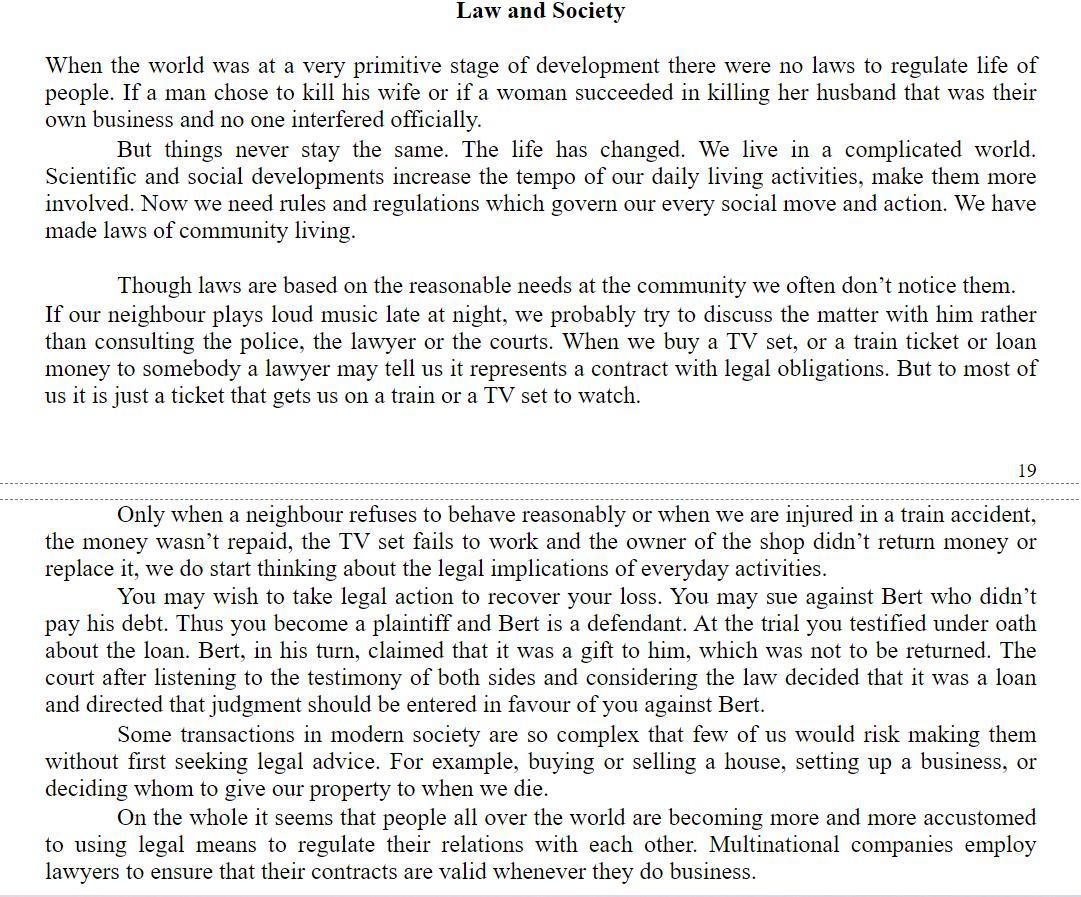Задание 3. Ответьте на вопросы.
1. Were there any laws when the world was at a very primitive stage of development?
2. Why do we need rules and regulations nowadays?
3. Do we notice laws? Why?
4. When do we start thinking about the legal implications of our everyday activities?
5. In what case may we sue against Bert?
6. Where do we testify under oath?
7. Did Bert win or lose the case?
8. In what cases do people seek legal advice?
9. Why do companies employ lawyers?
Ответы
Ответ:
- No, there weren't any laws when the world was at a very primitive stage of development.
- Today, we live in a much more complicated world that has developed socially and scientifically, which means that we now need rules to govern all our social moves and actions.
- We often don't notice laws because usually we can manage things on our own.
- We start thinking about legal implications of our everyday activities only when we feel that things are out of control and we can't handle them ourselves.
- We may sue against Bert in case he didn't pay his debt.
- We testify under oath at the trial.
- In this example, Bert lost the case.
- People seek legal advice when transactions are too complex - buying or selling a house, setting up a business, or deciding whom to give our property to when we die.
- Companies employ lawyers to make sure that their contracts are valid.
Объяснение:
Текст во вложении.
1. Существовали ли какие-нибудь законы на очень примитивной стадии развития мира?
Нет, не существовало никаких законов, когда мир был на очень примитивной стадии развития.
- "When the world was at a very primitive stage of development there were no laws to regulate life of people."
2. Почему нам сейчас нужны законы и правила?
Сегодня мы живем в гораздо более сложном мире, который развился в социальном и научном плане, что значит, что теперь нам нужны правила, которые бы управляли всеми нашими социальными мероприятиями и действиями.
- "But things never stay the same. The life has changed. We live in a complicated world. Scientific and social developments increase the tempo of our daily living activities, make them more involved. Now we need rules and regulations which govern our every social move and action. We have made laws of community living."
3. Замечаем ли мы законы? Почему?
Мы часто не замечаем законы, потому что обычно мы можем самостоятельно со всем справиться.
- "Though laws are based on the reasonable needs at the community we often don’t notice them. If our neighbour plays loud music late at night, we probably try to discuss the matter with him rather than consulting the police, the lawyer or the courts. When we buy a TV set, or a train ticket or loan money to somebody a lawyer may tell us it represents a contract with legal obligations. But to most of us it is just a ticket that gets us on a train or a TV set to watch."
4. Когда мы начинаем задумываться о юридических последствиях наших повседневных занятий?
Мы начинаем задумываться о юридических последствиях наших повседневных занятий, когда понимаем, что все выходит из-под контроля и мы не можем с этим справиться сами.
- "Only when a neighbour refuses to behave reasonably or when we are injured in a train accident, the money wasn’t repaid, the TV set fails to work and the owner of the shop didn’t return money or replace it, we do start thinking about the legal implications of everyday activities"
5. В каком случае мы можем подать в суд на Берта?
Мы можем подать в суд на Берта в случае, если он не выплатил долг.
- "You may sue against Bert who didn’t pay his debt."
6. Где мы даем показания под присягой?
Мы даем показания под присягой в суде.
- "At the trial you testified under oath about the loan."
7. Берт выграл или проиграл дело?
В этом примере Берт проиграл дело.
- "The court after listening to the testimony of both sides and considering the law decided that it was a loan and directed that judgment should be entered in favour of you against Bert."
8. В каких случаях люди обращаются за юридической консультацией?
Люди обращаются за юридической консльтацией, когда сделки слишком сложны - покупка или продажа дома, организация бизнеса или решение, кому оставить собственность после смерти.
- "Some transactions in modern society are so complex that few of us would risk making them without first seeking legal advice. For example, buying or selling a house, setting up a business, or deciding whom to give our property to when we die."
9. Почему компании нанимают юристов?
Компании нанимают юристов, чтобы быть уверенными, что их контракты действительны.
- "Multinational companies employ lawyers to ensure that their contracts are valid whenever they do business."
#SPJ1
